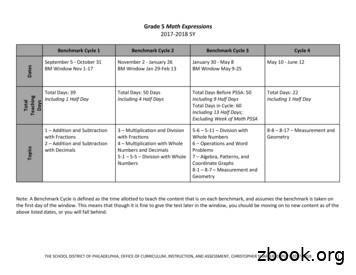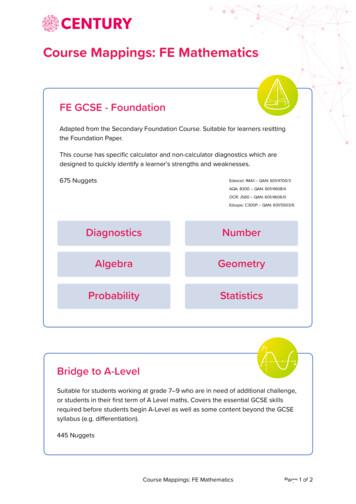Recurring Decimals GCSE Mark Score (%) Edexcel Mathematics
Name:Date:Recurring DecimalsGCSEEdexcelMathematicsGrade (9-1)MarkScore (%)58MaterialsFor this paper you must have:RulerPencil, Rubber, Protractor and CompassScientific calculator, which you are expected to use when appropriateInstructionsAnswer all questionsAnswer questions in the space providedAll working must be shownDo all rough work in this book. Cross out any rough work you don't want to be markedInformationThe marks for the questions are shown in brackets
1LeaveblankConvert the following recurring decimals to fractions.Give each answer in its simplest form.(a) 0.1111 (2)(b) 0.204204 (2)(Total for question 1 is 4 marks)2Write 0. ̇ 8̇ as a fraction in its simplest form. (Total for question 2 is 2 marks)www.examqa.com
3LeaveblankConvert 6̇ into a fraction.Give your answer as fraction in its lowest form.(Total for question 3 is 2 marks)4̇ into a fraction.ConvertGive your answer as fraction in its lowest form.(Total for question 4 is 2 marks)www.examqa.com
Leaveblank6 Convert2̇5̇ into a fraction.5 Robert, John and Peter were given 3 equal lengths of rods. RobertGive your answer as fraction in its lowest form.cut his rod into pieces 42 cm long, John cut his rod into pieces 24cm long and Peter cut his rod into pieces 60 cm long. If there wasno remainder in each case, what was the shortest length of rodgiven to each of them? (Total for question 5 is 3 marks)76Convert 2̇25̇ into a fraction.Give your answer as fraction in its lowest form.Complete the table below.FractionDecimalPercentage42.50.8767/9.(Total for question 6 is 3 marks)www.examqa.com
7LeaveblankProve algebraically that the recurring decimal 0.2̇ 6̇ can be written as 837(Total for question 7 is 3 marks)̇ intowith108 Janeuses somealphabets written on them to spell out the word BANANAConvert4̇5tilesa fraction.Give your answer as fraction in its lowest form.B A N A N AShe removes all ‘N’ tiles.What percentage of original tiles are left? (Total for question 8 is 2 marks)www.examqa.com
9Convert 5̇ into a fraction.Give your answer as mixed fraction.Leaveblank.(Total for question 9 is 2 marks)10thinkstwoa numbers.̇ into10 OliviaConvert2 6offraction. TheGive your answer as a mixed fraction. (Total for question 10 is 3 marks)www.examqa.com
Write5 5̇ asa fractionin its lowest form.1111Thediagramshowsa fair spinner.Leaveblank.(Total for question 11 is 2 marks)12 Write 0.6451451451 . as a fraction in its simplest form.(Total for question 12 is 3 marks)www.examqa.com
13 x is an integer such that 1 x 913 TThe LCM of two numbersis 130. The HCF of the same𝑥Provethat 0.0𝑥̇ 90twonumbersis 13.Both numbers are less than 100. Writedown two possible numbers.Leaveblank.(Total for question 13 is 3 marks)14 Convert 0 2̇9̇ into a fraction.(Total for question 14 is 2 marks)www.examqa.com
Leaveblank15 Find the fraction, in its lowest terms, equal to the recurring decimal 0.05̇2̇ 4̇.(Total for question 15 is 3 marks)̇.(Total for question 16 is 4 marks)www.examqa.com
17LeaveblankWork out: 0.07̇ 0. ̇ 85̇ (Total for question 17 is 4 marks)18 Arrange the numbers below in ascending order:1123̇ ̇,, 0.472511.(Total for question 18 is 3 marks)www.examqa.com
Leaveblank19 Work out the followingGive your answer as a simplified fraction.0. ̇ 2̇0. ̇0 6̇.(Total for question 19 is 3 marks)20 Arrange the following in descending order: (Total for question 20 is 5 marks)www.examqa.com
Grade (9-1) _ 58 (Total for question 1 is 4 marks) 2. Write ̇8̇ as a fraction in its simplest form. . 90. 15 blank Find the fraction, in its
Matthew 27 Matthew 28 Mark 1 Mark 2 Mark 3 Mark 4 Mark 5 Mark 6 Mark 7 Mark 8 Mark 9 Mark 10 Mark 11 Mark 12 Mark 13 Mark 14 Mark 15 Mark 16 Catch-up Day CORAMDEOBIBLE.CHURCH/TOGETHER PAGE 1 OF 1 MAY 16 . Proverbs 2—3 Psalms 13—15 Psalms 16—17 Psalm 18 Psalms 19—21 Psalms
whole numbers and positive decimals. Order a set of positive whole numbers and decimals. 1-2 Learning Targets: Add and subtract multidigit decimals. Solve real-world problems by adding and subtracting decimals. 1-3 Learning Targets: Multiply multidigit decimals. Sub
Adding & Subtracting fractions 28-30 Multiplying Fractions 31-33 Dividing Fractions 34-37 Converting fractions to decimals 38-40 Using your calculator to add, subtract, multiply, divide, reduce fractions and to change fractions to decimals 41-42 DECIMALS 43 Comparing Decimals to fractions 44-46 Reading & Writing Decimals 47-49
Oct 05, 2017 · Understand decimals to thousandths. 2-3 Equate and Compare Thousandths Compare decimal numbers through thousandths. 3-3 ays BIG IDEA 2: Addition and Subtraction 2-4 Adding and Subtracting Decimals Use models to add and subtract decimals. M05.A-T.2.1.3 M05.D-M.1.1.1 2-5 Add Whole Numbers and Decimals Add decimals by aligning their place values. 2-6
Exercise Worksheets . Add & Subtract Fractions 11. Add & Subtract Mixed Numbers 12. Multiply Fractions 13. Divide Fractions DECIMALS 14. Decimals to Fractions 15. Add & Subtract Decimals 16. Multiply Decimals 17. Divide Decimals . Worksheet #3 Multiplying Whole Numbers 46 x 72 205 x 34 493 x 67 800 x 30 376 x 18 776 x 98 2309 x 278 79,248 x .
Decimals to Fractions (Calculator) [MF8.13] Ordering Fractions, Decimals and Percentages 1: Unit Fractions (Non-Calculator) [MF8.14] Ordering Fractions, Decimals and Percentages 2: Non-Unit Fractions (Non-Calculator) [MF8.15] Ordering Fractions, Decimals and Percentages 3: Numbers Less than 1 (Calculator) [MF8.16] Ordering Fractions, Decimals .
14 GCSE Maths in a Week (Foundation) GCSE MATHS EXAM STRUCTURE Your GCSE Maths (Foundation) examination is comprised ofthree sections: Paper 1: Non-Calculator 1 hour and 30 minutes 33.3% of GCSE Marks out of 80 Paper 2: Calculator 1 hour and 30 minutes 33.3% of GCSE Marks out of 80 Paper 3: Calculator 1 hour and 30 minutes 33.3% of GCSE Marks .
Specifications for GCSE Physics include the physics and How Science Works content from GCSE Science and GCSE Additional Science. In addition, they include further extension topics in physics. Taken together, GCSE Biology, GCSE Chemistry and GCSE Physics cover the entire science Programm























